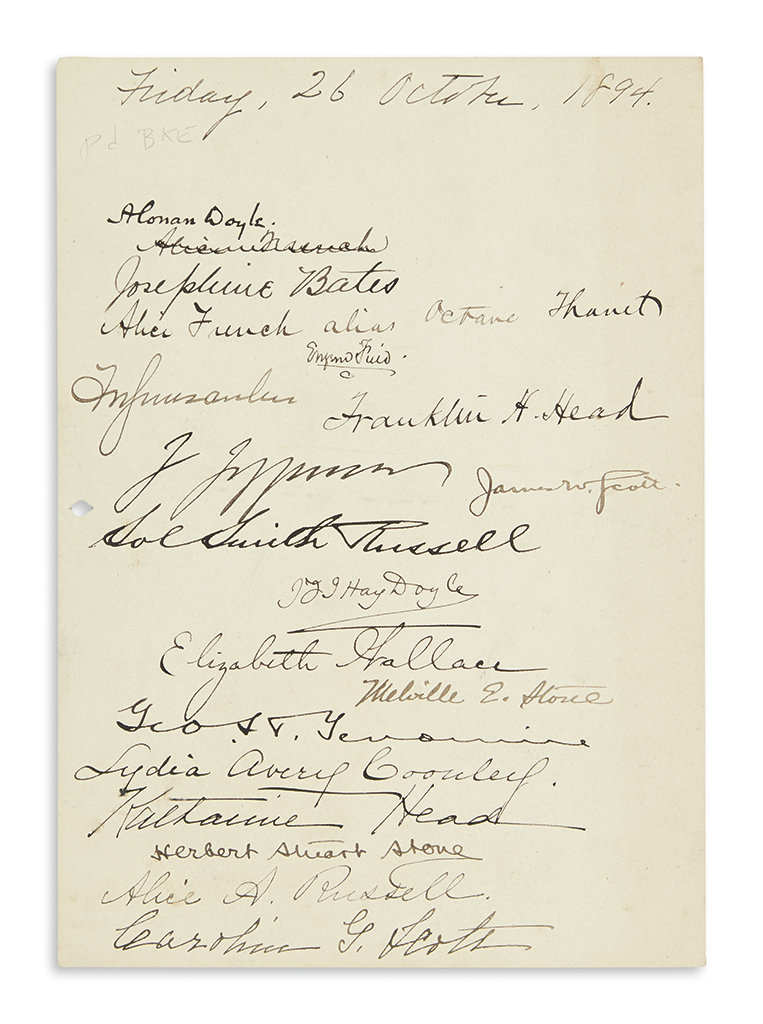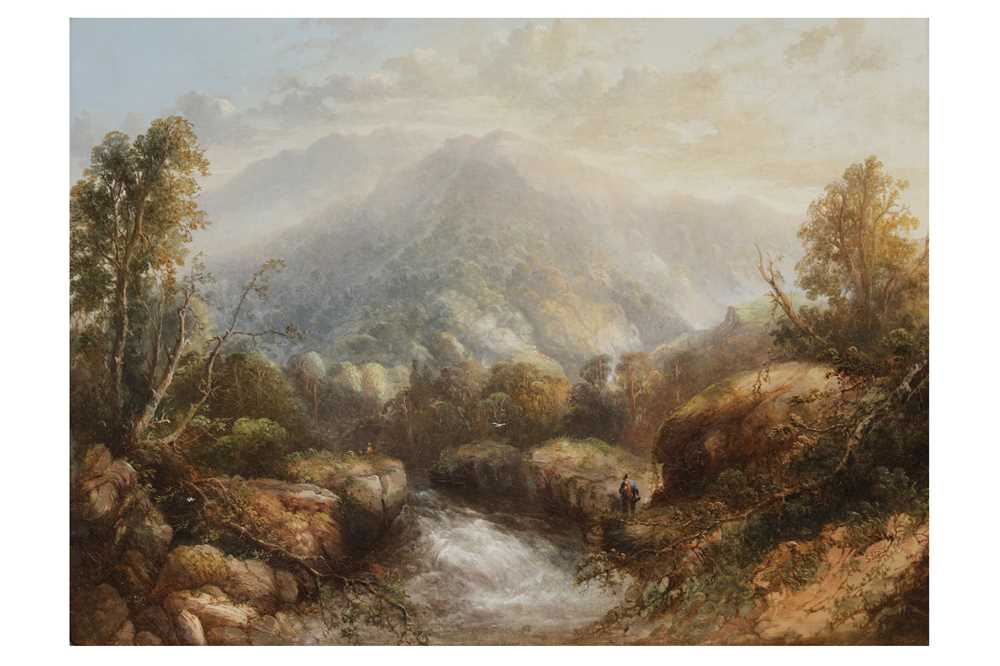INNES DOYLE A series of approximately 185 autograph letters signed to his brother, Sir Arthur Conan Doyle, Umballa (Punjab), Summer Palace, Peking, Japan, Tien Tsiu, South Africa (Harrismith and Mooi River), Camberley, Durham, Gateshead and Western Front (from March 1915), 31 May 1899 - 29 November 1918 and n.d. (lacuna between January 1904 and January 1909); and 32 autograph letters signed to his sister Ida, 15 to Lady (Jean) Conan Doyle, 3 to his mother and two to other members of his family; together with a photograph and printed ephemera. Conan Doyle's relationship with Innes was perhaps his closest with any member of his family, and Innes's letters show an ingenuous interest in all his brother's affairs, as well as laconic reports of fields of action including the Boxer Rebellion, the Boer War and the First World War. At the earliest stage of the correspondence he is a lieutenant serving in India, playing a good deal of polo and cricket, complaining about the Indians ('The native is not to be trusted ...') and bemoaning his 'curst luck ... with regard to active service'. His pay is often supplemented by Arthur, and there are frequent thanks for cheques -- on one occasion for £100 [equal to five months' pay]; on another 'Ever so many thanks for your three blank cheques'. In 1899, their sister Lottie came out to India to marry Captain Leslie Oldham, and the letters of this period include much news of her: 'Lottie was looking very well when I left her ... She was wearing a decided fake fringe as the monsoon had completely bedraggled her own'. Innes at this period often enquires after his brother's literary news -- 'Lottie gives me to understand that you are pleased with Gillette' -- though his own views are not always favourable: ' Hilda Wade [by Grant Allen, completed by Conan Doyle] is awful! The man feeds his horse before he waters it, and ought to be run in for risking its life'. The return of Sherlock Holmes is greeted with enthusiasm: 'Good old Sherlock. I think he has had quite a long enough rest'. The longed-for active service (or something close to it) takes Innes to Peking in January 1901, though he is far from overawed -- 'I went over the Forbidden City the other day and was not impressed at all'; the Chinese are friendly but 'most annoying on the golf course where they retrieve your ball with greatest zeal'. During this period and his subsequent posting to the last months of the Boer War (from February 1902), Innes's letters are much concerned with army reform, and this pre-occupation continues throughout the years of peace that follow. At the outbreak of the Great War, Innes's first responsibility is to attempt to dissuade his brother from trying for a commission in the New Army -- convinced that he would be best offering his services directly to the Prime Minister. Innes himself is initially with the 3rd County of Durham Brigade, Royal Field Artillery in Gateshead, defending the North East from invasion; but from March 1915 he is posted to the Front. Here is observations on the war are often shrewd, and usually technically minded -- as an artillery officer, he is attentive to different types of shells, and remarks that 'The grenade throwing is to my mind the most extraordinary thing in the fighting. It is often decisive when shooting and bayonet charging fail'. There are detailed descriptions of a number of battles, in particular Neuve Chapelle in the early period: 'It is astounding to see the two lines of trenches opposing each other, so close together. The very big shells make such an upheaval that numbers of men get buried and are never seen again'. Amongst what is evidently a very heavy workload, Innes pays attention to Arthur's unfolding history of the war, with a sharp eye to inaccuracy of detail -- 'You have got the units mixed a bit too and I shall gradually put them right' -- at one point interjecting good-humouredly 'you will think I never agree with anything you think ...'. On a number of points
INNES DOYLE A series of approximately 185 autograph letters signed to his brother, Sir Arthur Conan Doyle, Umballa (Punjab), Summer Palace, Peking, Japan, Tien Tsiu, South Africa (Harrismith and Mooi River), Camberley, Durham, Gateshead and Western Front (from March 1915), 31 May 1899 - 29 November 1918 and n.d. (lacuna between January 1904 and January 1909); and 32 autograph letters signed to his sister Ida, 15 to Lady (Jean) Conan Doyle, 3 to his mother and two to other members of his family; together with a photograph and printed ephemera. Conan Doyle's relationship with Innes was perhaps his closest with any member of his family, and Innes's letters show an ingenuous interest in all his brother's affairs, as well as laconic reports of fields of action including the Boxer Rebellion, the Boer War and the First World War. At the earliest stage of the correspondence he is a lieutenant serving in India, playing a good deal of polo and cricket, complaining about the Indians ('The native is not to be trusted ...') and bemoaning his 'curst luck ... with regard to active service'. His pay is often supplemented by Arthur, and there are frequent thanks for cheques -- on one occasion for £100 [equal to five months' pay]; on another 'Ever so many thanks for your three blank cheques'. In 1899, their sister Lottie came out to India to marry Captain Leslie Oldham, and the letters of this period include much news of her: 'Lottie was looking very well when I left her ... She was wearing a decided fake fringe as the monsoon had completely bedraggled her own'. Innes at this period often enquires after his brother's literary news -- 'Lottie gives me to understand that you are pleased with Gillette' -- though his own views are not always favourable: ' Hilda Wade [by Grant Allen, completed by Conan Doyle] is awful! The man feeds his horse before he waters it, and ought to be run in for risking its life'. The return of Sherlock Holmes is greeted with enthusiasm: 'Good old Sherlock. I think he has had quite a long enough rest'. The longed-for active service (or something close to it) takes Innes to Peking in January 1901, though he is far from overawed -- 'I went over the Forbidden City the other day and was not impressed at all'; the Chinese are friendly but 'most annoying on the golf course where they retrieve your ball with greatest zeal'. During this period and his subsequent posting to the last months of the Boer War (from February 1902), Innes's letters are much concerned with army reform, and this pre-occupation continues throughout the years of peace that follow. At the outbreak of the Great War, Innes's first responsibility is to attempt to dissuade his brother from trying for a commission in the New Army -- convinced that he would be best offering his services directly to the Prime Minister. Innes himself is initially with the 3rd County of Durham Brigade, Royal Field Artillery in Gateshead, defending the North East from invasion; but from March 1915 he is posted to the Front. Here is observations on the war are often shrewd, and usually technically minded -- as an artillery officer, he is attentive to different types of shells, and remarks that 'The grenade throwing is to my mind the most extraordinary thing in the fighting. It is often decisive when shooting and bayonet charging fail'. There are detailed descriptions of a number of battles, in particular Neuve Chapelle in the early period: 'It is astounding to see the two lines of trenches opposing each other, so close together. The very big shells make such an upheaval that numbers of men get buried and are never seen again'. Amongst what is evidently a very heavy workload, Innes pays attention to Arthur's unfolding history of the war, with a sharp eye to inaccuracy of detail -- 'You have got the units mixed a bit too and I shall gradually put them right' -- at one point interjecting good-humouredly 'you will think I never agree with anything you think ...'. On a number of points













Testen Sie LotSearch und seine Premium-Features 7 Tage - ohne Kosten!
Lassen Sie sich automatisch über neue Objekte in kommenden Auktionen benachrichtigen.
Suchauftrag anlegen